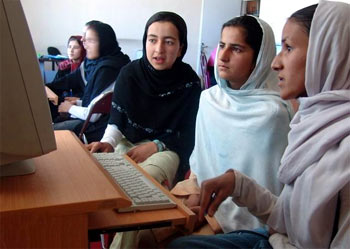Increasing information literacy of Afghan women
06-08-2007 (Kabul)

Afghan women being trained in
computer use and English language
© UNESCO/J. Musawer
A training programme provides women and girls with opportunities to gain access to the wider world through ICT.
UNESCO supports a programme run by the Polish Humanitarian Organization (PHO) to train 47 women from the Ministry of Women’s Affairs (MOWA) in computer use and English language.
UNESCO already funded a similar initiative in 2006 and was asked by PHO to bridge a funding gap over the summer months of 2007.
When the Taliban’s rule ended in 2001, many people considered its fall as liberation for Afghan people, especially for women and girls. The battle for women’s rights is not over yet and there are warning signs of a conservative backlash. However, a UNESCO-funded two-month project (1 July - 31 August 2007) in Kapisa province, 75 km north of Kabul, is providing women and girls with opportunities to gain access to the wider world through information and communication technologies (ICT).
The programme combines English with ICT because most of the content available online is in English, and the Internet is becoming more widely used in government and financial circles.
“Information and communication technology is fundamental to building a modern society today,” says Jacky Sutton, UNESCO’s Advisor for communication and information in Kabul. “Women are essential to this process and we need to ensure that communities in rural areas are not excluded either.”
“I didn’t even understand the English alphabet before, but now I can communicate and solve my problems,” says a trainee, Fayeza Wahaaj. “I am very happy that I can use a computer, it has facilitated my work.”
Maqbola Khalili, another trainee, is 16 years old. Nonetheless she was confident enough to be interviewed in English and said that in just one year she had learned a lot. “Before, I didn’t know anything about English or computers. During this training, I learnt four computer programmes and now I am learning the fifth one.”
Marta Wytrykowska, the PHO project coordinator, said that they were originally contacted by MOWA because there was no skilled staff at the Ministry in Kapisa to be able to use computers. According to her, women are very eager to learn but men are poor students. “We have to motivate men constantly and explain to them how important it is to build the capacity of the Ministry personnel. They need constant discussion and supervision.”
Kapisa was caught in fierce fighting in the 1990s and most of the residents fled to Pakistan and Iran, although some were displaced to Panjshir province. Many are now returning home to rebuild their homes and lives, bringing with them high expectations and a desire to learn. Across Kapisa, schools are now open for girls who have the opportunity to study up to university level.
UNESCO already funded a similar initiative in 2006 and was asked by PHO to bridge a funding gap over the summer months of 2007.
When the Taliban’s rule ended in 2001, many people considered its fall as liberation for Afghan people, especially for women and girls. The battle for women’s rights is not over yet and there are warning signs of a conservative backlash. However, a UNESCO-funded two-month project (1 July - 31 August 2007) in Kapisa province, 75 km north of Kabul, is providing women and girls with opportunities to gain access to the wider world through information and communication technologies (ICT).
The programme combines English with ICT because most of the content available online is in English, and the Internet is becoming more widely used in government and financial circles.
“Information and communication technology is fundamental to building a modern society today,” says Jacky Sutton, UNESCO’s Advisor for communication and information in Kabul. “Women are essential to this process and we need to ensure that communities in rural areas are not excluded either.”
“I didn’t even understand the English alphabet before, but now I can communicate and solve my problems,” says a trainee, Fayeza Wahaaj. “I am very happy that I can use a computer, it has facilitated my work.”
Maqbola Khalili, another trainee, is 16 years old. Nonetheless she was confident enough to be interviewed in English and said that in just one year she had learned a lot. “Before, I didn’t know anything about English or computers. During this training, I learnt four computer programmes and now I am learning the fifth one.”
Marta Wytrykowska, the PHO project coordinator, said that they were originally contacted by MOWA because there was no skilled staff at the Ministry in Kapisa to be able to use computers. According to her, women are very eager to learn but men are poor students. “We have to motivate men constantly and explain to them how important it is to build the capacity of the Ministry personnel. They need constant discussion and supervision.”
Kapisa was caught in fierce fighting in the 1990s and most of the residents fled to Pakistan and Iran, although some were displaced to Panjshir province. Many are now returning home to rebuild their homes and lives, bringing with them high expectations and a desire to learn. Across Kapisa, schools are now open for girls who have the opportunity to study up to university level.
 Afghan women being trained in computer use and English language
Afghan women being trained in computer use and English language© UNESCO/J. Musawer
Related themes/countries
· Afghanistan
· Gender and ICT: News Archives 2007
Share this story:
Contact information
- UNESCO
Source














